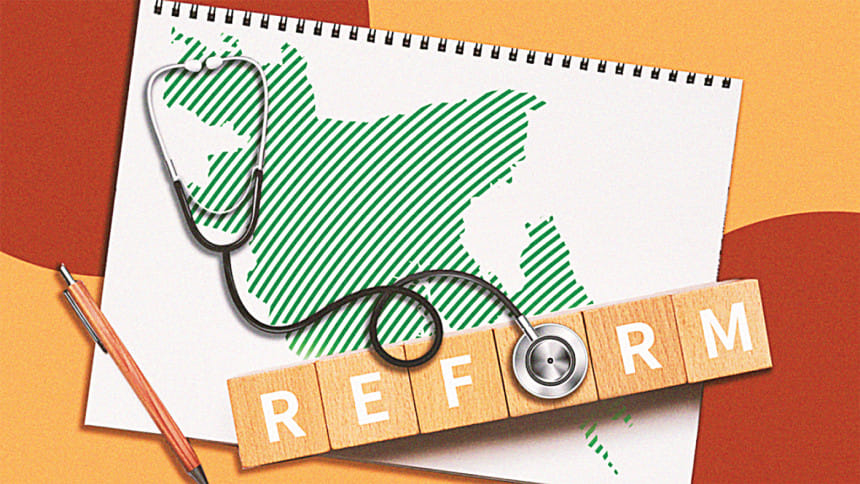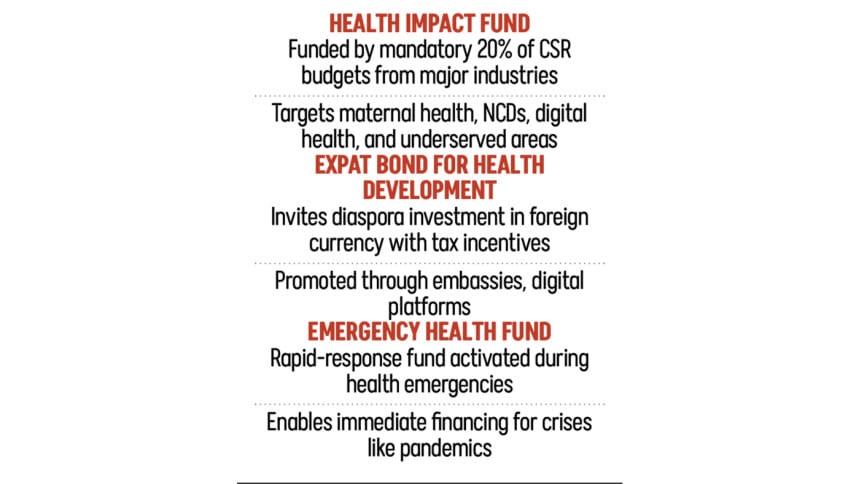Commission for CSR-driven health fund, expat bond

Aside from proposing a significant increase in the health budget, the Health Sector Reform Commission has suggested several innovative ways to mobilise funds to strengthen the country's underfunded health services.
The commission proposed forming at least three funds -- National Health Impact Fund, Expatriate Bond for Health Development, and Emergency Health Fund -- all to be jointly managed by the health and finance ministries and focused on specific areas within the health sector.
These proposals come at a time when the health sector receives only 5.2 percent of the national budget and just 0.74 percent of the GDP -- the lowest allocation among South Asian countries, according to the commission's report.
In its report submitted last week, the commission recommended allocating 15 percent of the national budget and 5 percent of GDP to the health sector.
HEALTH IMPACT FUND
The commission proposed setting up a National Health Impact Fund to ensure sustainable domestic financing for the health sector.
Large corporations -- particularly those in pharmaceuticals, banking, insurance, telecommunications, and chemicals -- would be required to allocate at least 20 percent of their Corporate Social Responsibility (CSR) budgets to this fund.
A clear policy framework should be developed to ensure the fund is used solely for health initiatives and supporting government priority programmes.
It would be jointly supervised by the health and finance ministries, with an independent, non-partisan management structure free from private influence, says the commission's report.
Key areas for investment would include maternal and child health, non-communicable disease prevention, digital health infrastructure, emergency services, and expanding healthcare access in underserved regions.
Alongside mandatory contributions, the fund would also encourage voluntary donations. To boost participation, the government may offer incentives such as public recognition as a "Health Impact Champion", honours at state events, involvement in policymaking forums, and financial benefits like tax exemptions or CSR credits, suggested the report.
Referring to similar initiatives in India and South Africa, the commission said this fund would make CSR investments more transparent, coordinated, and impactful.

EXPAT BOND FOR HEALTH DEVELOPMENT
The commission recommended introducing a government-backed bond titled "Expatriate Bond for Health Development" to create a sustainable source of financing for the health sector.
This bond would attract investments from Bangladeshi expatriates, offering competitive profit rates, tax exemptions or rebates, and allowing investments in foreign currencies.
The funds would be dedicated to improving the health sector -- especially primary healthcare, public hospital upgrades, digital health technologies, and social health insurance, alongside emergency health preparedness and response capacity.
The bond would be jointly managed by the health and finance ministries. To ensure engagement, the government should promote it through embassies, consulates, and digital platforms, said the report.
This initiative would reduce reliance on foreign aid and create a sustainable and long-term domestic funding source for the health sector.
Citing similar models in India and Ethiopia, the commission said it would also allow patriotic expatriates to contribute proudly and meaningfully to national development.
EMERGENCY HEALTH FUND
The commission also proposed an Emergency Health Fund to allow rapid, coordinated and well-financed responses to any future pandemics or public health emergencies.
This fund would be automatically activated once a predefined risk threshold is crossed, enabling quick release of necessary funds.
Like the other funds, it would be jointly overseen by the health and finance ministries.
The commission cited examples from Vietnam and the African Union, stating that the government must establish such a fund to improve response times during public health crises, reduce deaths and economic losses, and boost the health sector's long-term financial and risk resilience.

 For all latest news, follow The Daily Star's Google News channel.
For all latest news, follow The Daily Star's Google News channel. 



Comments